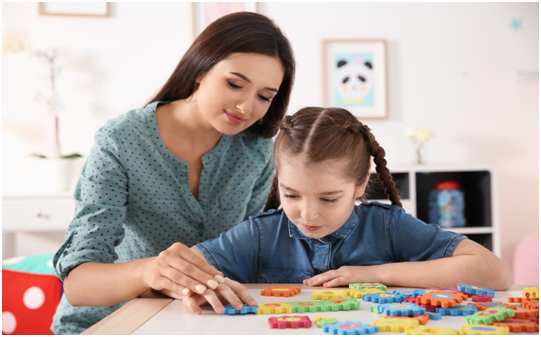Caring for a special needs child can become very overwhelming, very fast. Discover the complete guide to caring for special needs children here.
Do you or your partner have a family history of having special needs children? Are you worried that you may also have one when you give birth? Do you want to be ready to take care of special needs children in case you get any?
One in six kids aged 3-17 have a developmental disability and diagnoses have only increased. The likely reasons for this increase include improved awareness, screening, and service accessibility.
It can be disconcerting if you find out you have a child diagnosed with special needs. Below, we’ve got a list of things for new parents with special needs children to remember.

Establish a Good Support System
You don’t have to be alone in taking care of your kid. Your child may have a rare condition, but you are not alone. Many other parents face the same challenges, despite their children’s unique needs.
Look for these parents as a support system. It helps to know people who know what you’re going through. You may even learn some useful tips and tricks for managing your time with your child.
Join support groups or create one in your area. Share your story and learn about how other parents deal with their challenges. Speaking with other parents with special needs kids can be motivating and inspiring.
Educate Yourself on Handling Special Needs Children
Knowing your kid’s disabilities will help you know about any medical complications. Today, parents and family members have a lot of resources. You can find many books on parenting for kids with developmental issues or learning issues.
Find published books and studies on understanding kids with special needs. If you learn more from listening, you can find podcasts and videos. Additionally, you can consider investing in caregiver training to ensure you are prepared and educated to care for your child.
Learn everything you can about your child’s condition. This will help you sympathize with them and view the world from their perspective. It’ll help you develop a parenting style that will best work for them.
Enjoy Your Kids, Your Partner, and the Little Things
Be there for your child not only as a provider, but also as a caregiver. Remember to enjoy the silly little things. Cuddle, engage, and play with your child.
Make time to bring them to the local park to see the flowers or other kids. Tell them stories that will inspire them. Join them when they’re doing what they like or what’s important to them.
Don’t forget to make time for your marriage either. Being parents of a special needs child can feel like a never-ending marathon. However, remember that you and your partner have needs too.
Find strength in each other through small actions that show care and support. Make a special dinner for your spouse or bring them to a special place for a night. Lean into each other and keep cultivating your relationship so the family thrives.
Learn to Take a Break
It’s tough to be a good parent, especially for children with special needs. As we said, it can feel like a never-ending marathon of work, making appointments, and giving care. At some point, you’ll feel stressed out, exhausted, and unhappy to some degree.
Take a break and take the time to gather your bearings. Hire a caregiver or have a family member take care of your kids for a day. Use the free day to treat yourself to a spa day or spend a refreshing day at the beach.
De-stress in the way that works best for you. By the time you get back on track, you’ll feel a hundred times better. Don’t forget to give your partner the same courtesy if they volunteered to take care of your kids for you.
Teach Your Special Needs Child to Be Independent
Parents with special needs children must make difficult decisions for their kids. Unlike adults with special needs, kids don’t have a good grasp of what’s happening around them. Kids need to learn discipline and independence as much as they need to learn kindness.
With special needs kids, teaching them how to be independent takes more care. Teach your kids the skills they need to make decisions by providing choices. Avoid limiting their choices, but be careful about overwhelming them with too many.
Provide options where possible. This can help increase compliance and reduce difficult behaviors. In cases where choices are not available, provide guidance.
You Will Make Mistakes, and That’s Okay
All parents are afraid of making the wrong choices for their children. As the saying goes, no one is perfect — that includes you. You won’t always get things right, and that’s okay.
For many of the tough decisions you’ll make, there won’t be a wrong or right choice. As with most things, you’ll learn to make the best decisions. With time, you’ll gain the experience and wisdom to know what’s best for your child.
If you feel that you’ve made a terrible mistake, don’t focus on it too much. Learn to forgive yourself for any screw-ups, despite having the right intentions. Instead, you have to learn from the experience and keep moving forward with the lesson in mind.
Trust Your Instincts
It’s good to have doctors, therapists, and teachers to support you. However, remember, you are the parent. You know your children best.
If you feel that a professional isn’t giving your kid the care they need, you can get a second opinion. It helps to have an idea of where to go in case you encounter legal problems. Check out this law firm for legal aid specialized for those with special needs.
Give Your Child the Best Life
For parents of special needs children, you have a bigger responsibility. Yet, the difficult challenges of raising these kids are extra rewarding as well. Hang in there and be strong because it’s more than worth it in the end.
That’s it for our guide on taking care of a child with special needs. We hope this article helps all parents and to-be parents become ready for raising special needs kids. If you want to see more content on special needs children, check out our other posts.




























































